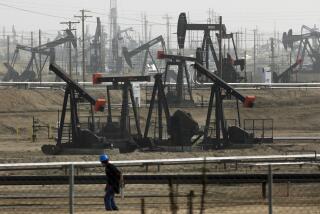British Petroleum to Put Limits on Its Emissions of Greenhouse Gases
- Share via
WASHINGTON — British Petroleum announced Tuesday that it will limit its emissions of greenhouse gases, voluntarily taking a major step that other companies are strongly resisting in the growing debate over global warming.
With President Clinton calling for binding targets to reduce the amount of carbon dioxide and other gases spewed into the atmosphere by factories, refineries and motor vehicles, BP’s announcement accentuates the oil industry’s central role in setting a course that would reduce the risk of dangerously overheating the global climate.
CEO John Browne, his reputation as a maverick in the oil business already established by his readiness to acknowledge that Earth’s climate may indeed be growing warmer, said his company will try out an emissions-limiting process that has potential for global use.
“The guy is clearly way out ahead of everybody here,” said a U.S. oil industry figure.
British Petroleum, the world’s third-largest energy company after Shell and Exxon, markets its products in more than 50 countries and has thousands of service stations in the U.S. and Europe.
A coalition of oil, mining and auto interests, other businesses and small-business organizations that opposes mandatory steps to reduce carbon emissions said it could not take issue with BP’s announcement, if only because the planned steps are voluntary.
“We would not support any sort of a binding target and timetable” for emissions reductions, said John Grasser, a spokesman for the Global Climate Coalition. His group does take issue with the theory that Earth’s surface temperature is increasing.
The British Petroleum program was worked out with the New York-based Environmental Defense Fund, which seeks cooperative approaches to environmental dilemmas.
Daniel J. Dudek, a senior economist at the fund, said the experiment reflects “a remarkable degree of optimism” on the part of British Petroleum “while the rest of the industry is putting its head in the sand and saying, ‘We can’t do anything about global warming.’ ”
Browne made the announcement in a speech in Berlin. The statement came as the Clinton administration deliberates what proposal it will make when negotiations resume in Bonn this month on a global treaty to reduce emissions of carbon dioxide, methane and nitrous oxide.
Many mainstream scientists believe carbon-based gases are responsible for an increase in average global temperatures, although others question whether such an increase is occurring, and, if it is, whether natural phenomena aren’t perhaps responsible.
Opponents of mandatory emissions targets, which Clinton favors, are trying to pressure the administration to refrain from signing a treaty with specific commitments. They maintain that restrictions on petroleum use would hurt the country economically.
“Americans would feel as if we were living through the oil price shocks of the 1970s and 1980s all over again,” said Murray Weidenbaum, a chairman of the White House Council of Economic Advisors during the Reagan administration.
In May, Browne made clear that his company saw business opportunities in measures intended to meet the challenge of global warming. He said that BP would invest heavily in solar energy, with a target of $1 billion in sales within the next decade.
On Tuesday, he reiterated his commitment to oil and gas, saying that their importance in meeting the world’s energy requirements dictate that “they are used with maximum efficiency and the minimum of emissions.”
“Accordingly, we are setting our own targets to measure and to report the volumes of carbon dioxide emitted from our own operations,” he said, promising that the system will be operating by next year. Then, he said, the company will establish “firm realistic targets” for emissions, with the results independently verified and disclosed.
More to Read
Sign up for Essential California
The most important California stories and recommendations in your inbox every morning.
You may occasionally receive promotional content from the Los Angeles Times.













